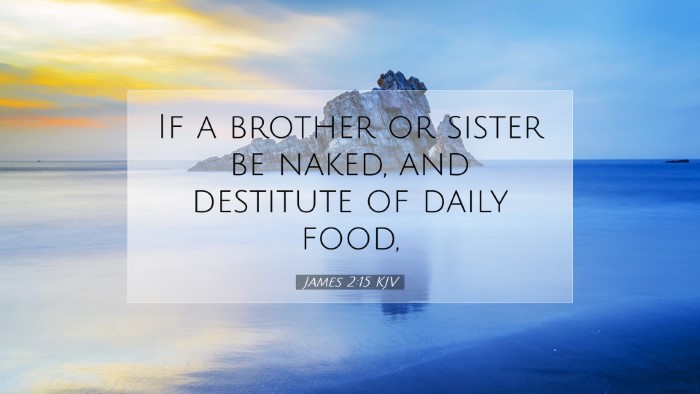Old Testament
Genesis Exodus Leviticus Numbers Deuteronomy Joshua Judges Ruth 1 Samuel 2 Samuel 1 Kings 2 Kings 1 Chronicles 2 Chronicles Ezra Nehemiah Esther Job Psalms Proverbs Ecclesiastes Song of Solomon Isaiah Jeremiah Lamentations Ezekiel Daniel Hosea Joel Amos Obadiah Jonah Micah Nahum Habakkuk Zephaniah Haggai Zechariah MalachiJames 2:15
James 2:15 KJV
If a brother or sister be naked, and destitute of daily food,
James 2:15 Bible Commentary
Commentary on James 2:15
James 2:15 states: "If a brother or sister is naked and destitute of daily food". This verse is a poignant exhortation that emphasizes the importance of tangible charity and compassion in the Christian life. In this commentary, we will draw insights from notable public domain commentaries such as those by Matthew Henry, Albert Barnes, and Adam Clarke to deepen the understanding of this scripture.
Contextual Overview
The context of James's epistle is vital for grasping the depth of his message. This letter addresses the Jewish believers who faced trials, temptations, and social injustice. James focuses on the practical aspects of faith, urging believers to embody their faith through actions, especially in how they treat others. This particular verse highlights the responsibilities of Christians toward those in need.
Exegesis of James 2:15
James 2:15 serves as a clear depiction of poverty and need. The terms "naked" and "destitute" convey a vivid image of desperation. Matthew Henry explains that the use of these terms emphasizes not just a physical lack but a profound moral and social obligation for those who recognize the plight of their fellow believers.
Theological Implications
James's inquiry regarding the fate of a naked and hungry brother or sister brings forth significant theological implications. It raises the question of how true faith manifests in practical ways. As Albert Barnes elucidates, this verse is not merely about a momentary feeling of pity but about a deliberate call to action. True faith is evidenced by the response to the needs of the community.
Moral Obligation and Responsibility
From this verse, we glean a sense of moral obligation. Adam Clarke points out that the New Testament's teachings consistently emphasize acts of kindness and charity. To neglect such responsibilities, particularly towards fellow believers, is to disregard the essence of Christian love. This underscores that faith without works, particularly in social compassion, is incomplete.
Comparative Insights
When we compare this verse with similar scriptures, such as 1 John 3:17, which states, "But whoso hath this world's good, and seeth his brother have need, and shutteth up his bowels of compassion from him, how dwelleth the love of God in him?", the message is consistent. Herein lies a unified spiritual doctrine advocating for a faith manifested through works.
Practical Application
For pastors, students, theologians, and Bible scholars, understanding and applying this verse calls for a reflective examination of one’s faith practices. How do we respond to the needs of those around us? Matthew Henry suggests that genuine faith should motivate believers to act in service and support of others. This includes not only providing for physical needs but also embodying grace and mercy in daily interactions.
Indispensable Acts of Charity
The practical applications of such teachings can be manifold:
- Community Engagement: Initiatives that directly assist the impoverished in the community or congregation.
- Personal Reflection: Regularly reflecting on how one's faith expresses itself in deeds, especially in times of social need.
- Preaching and Teaching: Incorporating the necessity of charity in sermons, emphasizing the call to respond to the needs of the brethren.
The Love of Christ in Action
In sum, James 2:15 brings to the fore the principle that true faith is expressed through love and action. The Apostle Paul’s words in Galatians 5:6 resonate with this idea: "Faith which worketh by love." The love that we have experienced in Christ compels us to respond to others’ needs. Our faith should produce fruits of compassion, making us active participants in the wellbeing of our communities.
Conclusion
James 2:15 challenges believers to embody a lived faith that meets the needs of others. Through insights gleaned from historical commentaries, it becomes clear that this call is not optional but a defining characteristic of what it means to follow Christ. The exhortation goes beyond simple acknowledgment—it demands action and involvement in the lives of those facing hardship.
As we reflect on this verse, may we be inspired to extend our hands and hearts to those in need, fulfilling the law of Christ through acts of love and charity.


